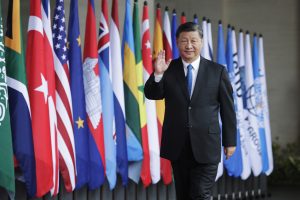After over a year and half of quiescence amid China’s tight COVID-19 restrictions, “Xi-plomacy” is back in a big way. Chinese President Xi Jinping returned to international travel in September 2022, with a trip to Kazakhstan and then Uzbekistan to attend the Shanghai Cooperation Organization (SCO) summit. In late October and early November, shortly after the 20th Party Congress concluded, he hosted top leaders from Vietnam, Pakistan, Tanzania, and Germany in Beijing.
But China’s diplomatic outreach really kicked into overdrive with Xi’s attendance at the G-20 Summit in Bali, Indonesia, where the Chinese leader squeezed in as many sideline meetings as possible. There are, as the name implies, 20 members of the G-20; subtracting out China, that leaves 19. Three G-20 leaders did not attend – Brazil’s President Jair Bolsanaro, fresh off a failed re-election bid; Mexico’s President Andres Manuel Lopez Obrador; and Russia’s President Vladimir Putin, whose country received fierce criticism throughout the summit for its ongoing invasion of Ukraine. That leaves 16 top leaders from G-20 members in Bali this week that Xi could meet with; he held formal bilateral sit-downs with nine of them. Foreign Minister Wang Yi held meetings with his counterparts from Mexico and Russia as well.
Xi also met with several world leaders who are not formally part of the G-20, including Spanish President Pedro Sanchez, Senegalese President Macky Sall (who is currently serving as chair of the African Union), Dutch Prime Minister Mark Rutte, and U.N. Secretary General Antonio Guterres.
Given the diplomatic outreach at work, it’s interesting to note who didn’t get a meeting with Xi (or Wang). In some cases, easy explanations come to mind: Brazil’s Bolsonaro administration is on its way out, so is a low-priority meeting at a busy time. Likewise, Xi just hosted Germany’s Chancellor Olaf Scholz in Beijing less than two weeks ago; a repeat handshake would be of limited value.
As for the United Kingdom, a meeting with new British Primer Minister Rishi Sunak was apparently on the schedule, but had to be scrapped when G-7 leaders huddled for an emergency discussion after a missile landed in Poland.
And few expected Xi to meet with Indian Prime Minister Narendra Modi. China-India ties have been in a deep freeze since a deadly clash along their disputed border in May 2020. The ice is so thick that a mere handshake between Xi and Modi at a G-20 group dinner made headlines; it was the first direct interaction between the two since the border clash, despite both attending the SCO summit in September.
But several of the empty slots on Xi’s diplomatic dance card are fascinating.
For one, Xi did not hold a formal bilateral meeting with Canada’s Prime Minster Justin Trudeau, but another interaction between the two went viral. The leaders reportedly had an unofficial meeting – a conversation lasting about 10 minutes “in a crowded room” – on November 15. The next day, Xi approached Trudeau to complain that “everything we discussed has been leaked to the paper; that’s not appropriate.” The oddly public reprimand – the whole exchange was caught on media cameras – raised eyebrows. From the lack of a formal meeting to the sour taste of the open disagreement on Wednesday, its seems Canada-China relations are far from recovered from the Meng Wanzhou saga.
Next, the absence of a meeting with the EU leaders in attendance – European Council President Charles Michel and European Commission President Ursula von der Leyen – was telling. Scholz’s outreach to China so soon after the 20th Party Congress received heavy criticism, not least from the EU itself. Whatever that visit meant for China-Germany relations, it clearly has not translated into bonhomie at the EU level.
Meanwhile, China’s relationship with Turkey is a complex one. Turkey is a NATO member but often the odd one out, and Erdogan sees China as an alternative partner, one that won’t take the Turkish leader to task for human rights violations and democratic backsliding. However, China’s mistreatment of the Uyghurs – a Turkic ethnic group with a strong diaspora presence in Turkey – has long rankled, especially in the sphere of Turkish public opinion. Erdogan has gone back and forth on speaking out over the issue; most recently, Turkey joined a joint statement to the U.N. expressing grave concern over rights abuses after abstaining from similar statements in previous years. Maybe that’s why Xi skipped out on meeting Erdogan in Bali. It’s also possible that Erdogan, who was in heavy demand as a “surprise power broker,” didn’t have time for Xi.
Perhaps the most fascinating miss of all is the lack of a meeting with Saudi Arabia’s Crown Prince Mohammed bin Salman. There have been reports of an impending Xi trip to Saudi Arabia for months. There were even rumors back in August that Xi would make Saudi Arabia the destination for his first post-pandemic trip abroad. That didn’t pan out, but media outlets continue to report a trip is coming, possibly in December.
Backstopping the trip are perceptions that Riyadh is sliding away from its traditional partnership with the United States and looking to bolster ties with China instead. Yet Xi didn’t have a formal sit-down with the Saudi crown prince in Bali.
Bin Salman’s diplomatic slate was relatively quiet overall, including official meetings with only Sunak, Erdogan, and the UAE president. He then headed to South Korea for a bilateral visit, but canceled planned trips to both India and Pakistan due to scheduling issues.
Notably, bin Salman did not hold formal meetings with Biden, Modi, or Xi at the G-20.
































